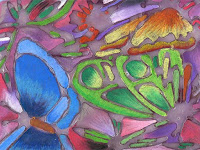 Cancer treatments can definitely have a physical impact on
the body during and after treatments. But did you know that they can also
affect the way someone thinks and feels? For many, it’s normal to experience a range
of side effects during treatment that can linger for months and sometimes years
after treatments end. In addition, there
are a myriad of emotions associated with a cancer diagnosis – such as stress
and anxiety. For some, these feelings
can also cause even more physical and emotional disorders like chronic fatigue
and depression.
Cancer treatments can definitely have a physical impact on
the body during and after treatments. But did you know that they can also
affect the way someone thinks and feels? For many, it’s normal to experience a range
of side effects during treatment that can linger for months and sometimes years
after treatments end. In addition, there
are a myriad of emotions associated with a cancer diagnosis – such as stress
and anxiety. For some, these feelings
can also cause even more physical and emotional disorders like chronic fatigue
and depression.
Many cancer survivors experience stress after cancer
diagnosis and following cancer treatment. While there is no research that
stress actually causes cancer, we do know that stress causes other health
problems. “Sustained stress hormones, over a long period of time, may even
damage our body on a cellular and molecular level. And, we are just beginning
to explore how the mind and body works in relation to our emotional states,” said
Teri Hoenemeyer, Ph.D., the director of Education and Supportive Services at
the UAB Comprehensive Cancer Center.
It’s important to have ways to cope with and reduce stress.
Many cancer survivors find that spending time participating in activities they enjoy
can help them feel calm or relaxed. “Often, patients will say that they feel
disconnected from their bodies, their emotions, and even their relationships
with others after a cancer diagnosis,” said Hoenemeyer. “Engaging in activities
that are comforting and meaningful to patients helps them become more
introspective and aware of just how much the stress of their disease and
treatment can impact how they feel. Once aware, they can then recognize
triggers so they can cope and manage better.” Some of the suggestions
Hoenemeyer provides for managing and coping with stress include:
-
Exercise is
a common way to reduce stress—whether you have had cancer or not. Exercise can
be as simple as a walk down your street or walking with a friend or neighbor
for 30 minutes. Check with your healthcare provider before exercising, it is
important not to overdo yourself and your body.
-
Mind-Body
Techniques refer to activities such as meditation, breathing techniques, or
gentle yoga intended to lower your stress level and calm your mind and body. These
can be done at-home and whenever you are experiencing stress.
-
Creative
Outlets include art, music, or dance and gives people a chance to express
themselves. You do not need to have experience with art, music, or dance to
participate in these activities and have fun doing them. They can be done at home
or by participating in a class offered in your community.
All of these activities are great ways for you and your
loved ones to reduce stress after cancer. Rehabilitation of the mind and body
is an important part of recovery.
Start reducing your stress today and attend this great art
event here at UAB:

Lilly Oncology on Canvas, UAB Arts in Medicine and the UAB Comprehensive Cancer Center are putting on an art event to honor anyone with a
cancer experience. The event will be held in the UAB North Pavilion of the UAB
Hospital on Thursday, August 17, 2017
from 11:00 a.m. – 1:00 p.m. You do
not need to have any art experience or supplies, everyone is welcome to attend!
For more information about this art event,
contact Dr. Hoenemeyer at tgw318@uab.edu or
(205) 934-5772. 
